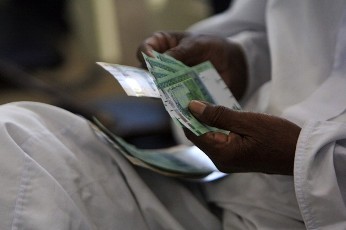Sudanese pound slides against US dollar amid oil shutdown fears
December 21, 2013 (KHARTOUM) – The price of the US dollar has witnessed significant increase in the black market in Khartoum on Saturday, settling at 8.05 Sudanese pounds (SDG), compared to 7.80 (SDG) last week.

The landlocked nation exports about 220,000 barrels of oil a day through pipelines across Sudan.
The traders also said that events in South Sudan led to the increase in importers’ demand for foreign exchange while supply is limited.
About 500 people had been killed in Juba since clashes broke out last Sunday between presidential guard units from the competing tribes of the Dinka and Nuer.
President Silva Kiir Mayardit, a Dinka, accused his former deputy from the Nuer tribe and his supporters of orchestrating an alleged coup attempt to overthrow the government.
Machar denied plotting a coup and accused Kiir of using the clashes to get rid of his political opponents. He also rejected Kiir’s offer to sit down for talks unless the latter agrees to step down first.
Informed sources have predicted that production in South Sudan’s Unity state oil fields would stop within the coming couple of days if clashes between Dinka and Nuer tribes didn’t stop.
It further said that clashes between the two tribes have not affected oil production so far but stressed that production would stop if clashes continued, pointing that operating companies began to evacuate their personnel and send them to Khartoum.
But Daniel Howden from the Economist magazine said on Twitter that oil workers evacuated at Juba airport told him that “our [oil companies] HQ instructed us to close the wells (Unity State), the oil fields are shut down. All of them”.
On Saturday, the fourth division commander of South Sudan’s army in oil-producing Unity state declared that he has deposed the caretaker governor and that his forces were no longer loyal to Kiir.
Khartoum expects to earn $500 million in revenue annually from transit fees of South Sudanese crude in 2013 since oil started flowing earlier this year after more than a year of suspension.
Sudan’s economy was hit hard since the southern part of the country declared independence in July 2011, taking with it about 75% of the country’s oil output.
(ST)

